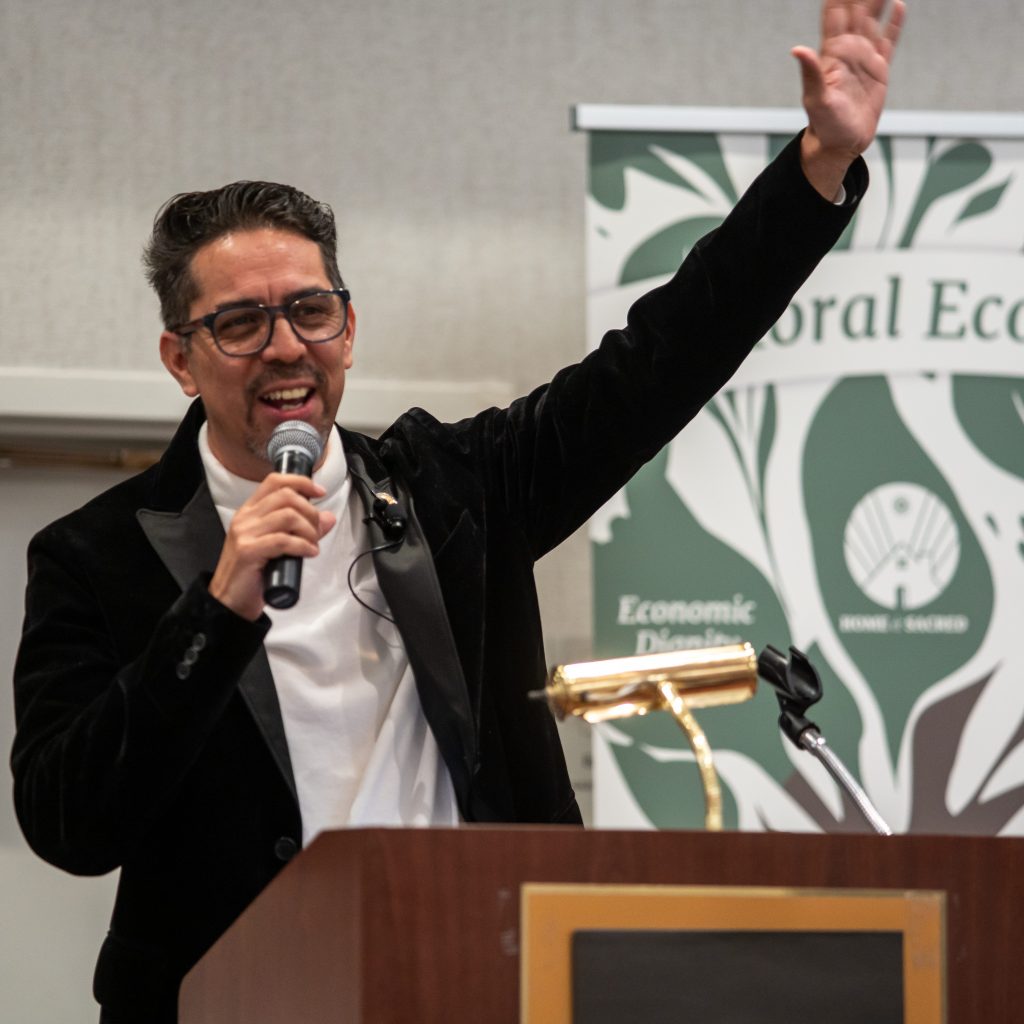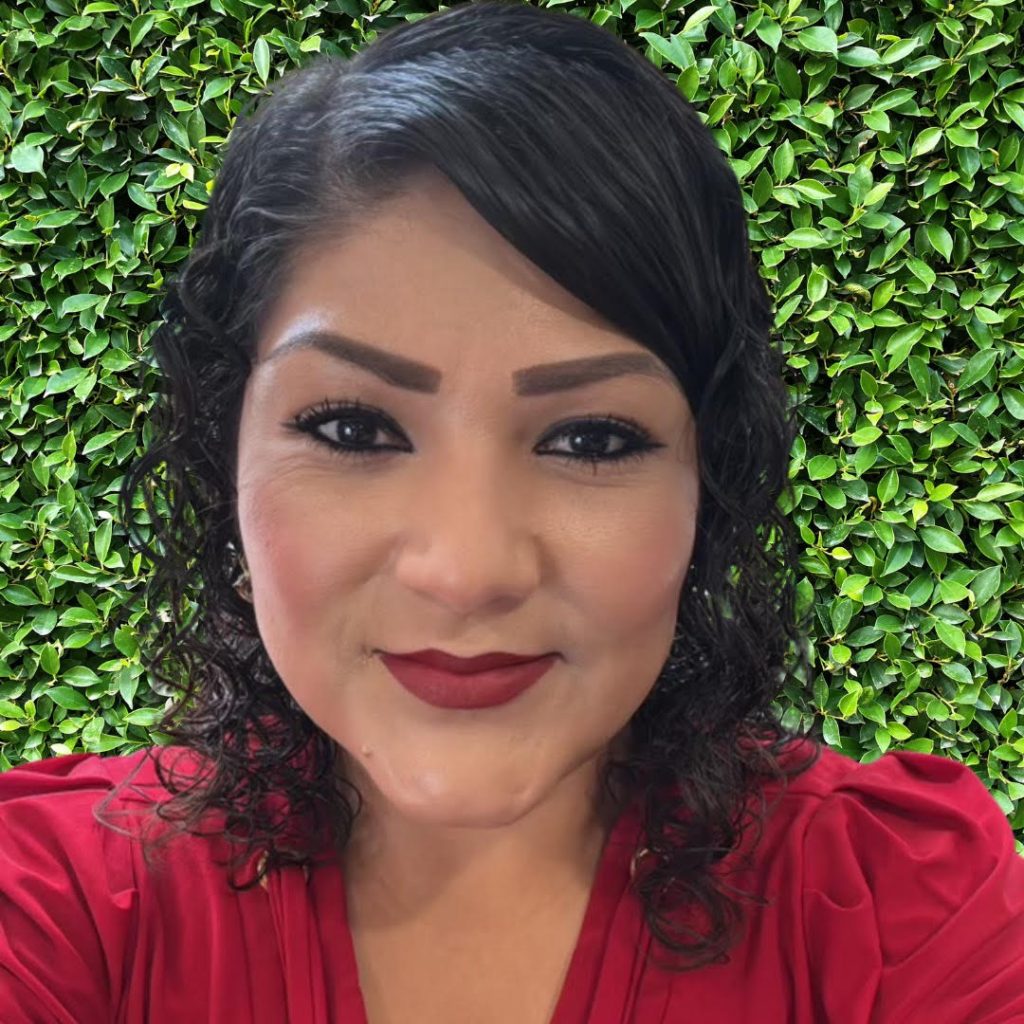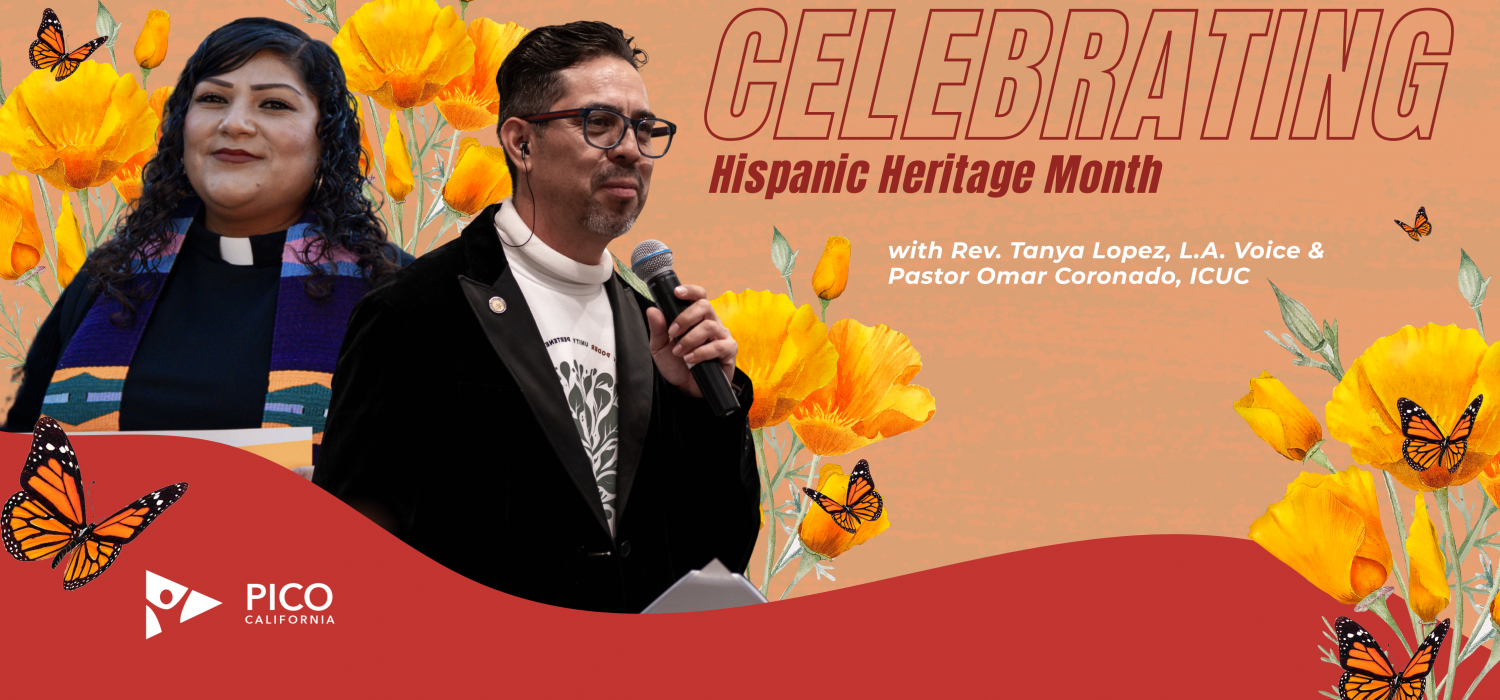At PICO California, our vision is to build a Moral Economy where every person, regardless of race, immigration status, or income, can live with dignity, opportunity and belonging. During Hispanic Heritage month we are uplifting the voices of Latino clergy who embody this vision in their ministry and in their communities.
This year we are honored to highlight two powerful faith leaders: Pastor Omar Coronado, Assistant Pastor at Iglesia Centro Libre Cristiano in Indio, California and a leader with Inland Congregations United for Change (ICUC) and Rev. Tanya Lopez, Senior Pastor at Downey Memorial Christian Church and First Vice-Moderator of the Christian Church (Disciples of Christ) in the Pacific Southwest Region.
Through their faith, both leaders remind us that the church is not limited to four walls, it is alive in the streets, fields and neighborhoods where families strive for justice, healing, and hope.
Q&A with Pastor Omar Coronado

Q1. For more than 17 years, you have accompanied migrant families and farmworker communities in California. How has your faith guided you in bringing hope and dignity to communities that often feel invisible?
Pastor Omar:
My faith has been the compass that sustains and drives me on this journey. The Bible teaches us that God listens to the cry of the foreigner, the orphan, and the widow, and I have seen those words come alive in the migrant families I share life with every day. Even though they often feel invisible to the system, in God’s eyes they are valuable and deeply loved. My pastoral work has been to remind them of that truth, to walk with them in their pain and their struggles, and to affirm that their dignity does not depend on a piece of paper but on the fact that they are daughters and sons of God.
Q2. You have said that the church is called to be “one big family, serving with genuine love.” How do you see that vision aligning with PICO California’s work to build a Moral Economy for all Californians?
Pastor Omar:
The vision of the church as one big family doesn’t stay within the four walls of a temple; it lives in the community, in the streets, in the fields, in the places where people fight to survive. A true family shares the table, defends the most vulnerable, and celebrates everyone’s achievements. PICO California embodies that vision by working for a Moral Economy, where every person, regardless of immigration status, skin color, or social standing, has access to opportunity, justice, and dignity. For me, walking alongside PICO is a natural extension of faith: turning love into action.
Q3. The communities you serve continue to face the fear and trauma of ICE raids and deportations. What role do you believe faith leaders can play in protecting families and defending their dignity?
Pastor Omar:
Faith leaders are called to be guardians of hope. In times of raids and deportations, we cannot be neutral or remain silent. Our voices and our presence serve as a spiritual and moral shield for our communities. We open the doors of our churches as sanctuaries, accompany families in court, speak on behalf of those too afraid to raise their voices, and lift public awareness so that society sees the human face behind each case. Our faith compels us to defend the dignity of every person and to remind the world that God’s justice knows no borders.
Q&A with Rev. Tanya Lopez

Q1. As a first-generation bilingual daughter of immigrants, how has your heritage shaped your ministry and the way you build bridges across communities and generations?
Rev. Tanya:
Like many first-generation children of immigrants, my entire life has been defined by a constant walk across cultures. I see this as a gift. I choose to build bridges that connect my cultures rather than divide them. Our congregation is made up of Hispanic/Latino families and White families. There are many subcultures within our congregation, but most of our Spanish speaking members connect through language and shared cultural values. While I was born and raised in southern California, my mother and grandmother were immigrants. I experienced first-hand the challenges of navigating a new language, a new culture, and the isolation of being separated from one’s family and community. This helps me to connect with those within the congregation that have immigrated, with those who are children of immigrants, and with those who have been othered in this country.
I can also wrestle, alongside the members of my congregation, with the beauty and challenges of being an American today while still advocating, standing with, and defending all families. I believe that our chur
Q2. Empowering women to live their faith authentically is central to your calling, what does that empowerment look like in practice and why is it important during Hispanic Heritage Month?
Rev. Tanya:
I firmly believe that empowering women to lead is how we grow and thrive together in the world. This is a central part of my call because women are still excluded, marginalized, and silenced. This isn’t just important during Hispanic Heritage Month, but every day. Empowerment in practice looks like equity. It looks like women being treated as equals in every aspect of our society. It looks like workspaces, schools, houses of worship, and entire neighborhoods where women are safe and given equal opportunities to be actively engaged in their communities.
ch is an example of what is possible when we choose to remain together, grow together, and to embrace and celebrate our differences. Together we help to foster and to nurture the Kin-dom of God in our Sanctuary.
Empowerment looks like women being freed from the gender norms that for too long have kept them from living into their fullest potentials. Empowerment looks like accountability in churches and in society so that women are no longer conditioned to believe that they can’t lead outside of established gendered roles.
Q3. Many immigrant families in our congregations live under the threat of ICE raids. How do you see the church providing not just spiritual care, but also a place of protection and solidarity in these moments?
Rev. Tanya:
The church has always been sought by many as a place of safety and refuge. Since its birth after the outpouring of the Holy Spirit at Pentecost, the church has strived to be the community that has ensured that people are fed, prayed over, and cared for. When faced with persecution and violence, they literally kept one another safe.
The church is still doing this work today and it must continue to do this work. Caring for families and individuals who are facing immeasurable challenges due to ICE raids is in the DNA of the church. We are called to provide spiritual care, but we are also called to defend those being persecuted; to open our doors and to shield them from harm. We are called to love them by standing in solidarity with them and by actively working to create a world where dehumanizing and harmful policies and practices are no more.
///
En PICO California, nuestra visión es construir una Economía Moral donde cada persona, sin importar su raza, estatus migratorio o nivel de ingresos, pueda vivir con dignidad, oportunidades y sentido de pertenencia. Durante el Mes de la Herencia Hispana, elevamos las voces del clero latino que encarnan esta visión en su ministerio y en sus comunidades.
Este año tenemos el honor de destacar a dos líderes de fe poderosos: el Pastor Omar Coronado, Pastor Asistente en la Iglesia Centro Libre Cristiano en Indio, California y líder con Inland Congregations United for Change (ICUC), y la Reverenda Tanya López, Pastora Principal en Downey Memorial Christian Church y Primera Vice Moderadora de la Iglesia Cristiana (Discípulos de Cristo) en la Región del Suroeste del Pacífico.
A través de su fe, ambos líderes nos recuerdan que la iglesia no se limita a cuatro paredes, sino que está viva en las calles, los campos y los vecindarios donde las familias luchan por justicia, sanidad y esperanza.
Q&A with Pastor Omar Coronado

Q1. Durante más de 17 años ha acompañado a familias migrantes y comunidades campesinas en California. ¿Cómo le ha guiado su fe para llevar esperanza y dignidad a comunidades que muchas veces se sienten invisibles?
Pastor Omar:
Mi fe ha sido la brújula que me sostiene y me impulsa en este caminar. La Biblia nos enseña que Dios escucha el clamor del extranjero, del huérfano y de la viuda, y yo he visto cómo esas palabras cobran vida en las familias migrantes con las que comparto cada día. Aunque muchas veces se sienten invisibles para el sistema, en los ojos de Dios son valiosas y amadas. Mi labor pastoral ha sido recordarles esa verdad, acompañarlos en su dolor y también en sus luchas, afirmando que su dignidad no depende de un papel migratorio, sino de que son hijas e hijos de Dios.
Q2. Usted ha dicho que la iglesia está llamada a ser “una gran familia, sirviendo con amor genuino.” ¿Cómo ve que esa visión se alinea con el trabajo de PICO California para construir una Economía Moral para todos los californianos?
Pastor Omar:
La visión de la iglesia como una gran familia no se queda en las cuatro paredes del templo; se vive en la comunidad, en las calles, en los campos, en los lugares donde la gente lucha por sobrevivir. Una familia verdadera comparte la mesa, defiende al más débil y celebra los logros de todos. PICO California encarna esa visión al trabajar por una Economía Moral, donde cada persona —sin importar su estatus migratorio, color de piel o condición social— pueda tener acceso a oportunidades, justicia y dignidad. Para mí, caminar junto a PICO es una extensión natural de la fe: transformar el amor en acción.
Q3. Las comunidades a las que sirve siguen enfrentando el temor y trauma de las redadas de ICE y las deportaciones. ¿Qué papel cree que pueden jugar los líderes de fe en la protección de las familias y la defensa de su dignidad?
Pastor Omar:
Los líderes de fe somos llamados a ser guardianes de la esperanza. En tiempos de redadas y deportaciones, no podemos ser neutrales ni quedarnos en silencio. Nuestra voz y nuestra presencia son un escudo espiritual y moral para nuestras comunidades. Abrimos las puertas de nuestras iglesias como santuarios, acompañamos a las familias en los tribunales, hablamos en nombre de quienes tienen miedo de hablar, y elevamos la conciencia pública para que la sociedad vea el rostro humano detrás de cada caso. La fe nos impulsa a defender la dignidad de cada persona y a recordar que la justicia de Dios no conoce fronteras.
Preguntas y Respuestas con la Rev. Tanya López

P1. Como hija bilingüe de inmigrantes de primera generación, ¿cómo ha moldeado su herencia su ministerio y la manera en que construye puentes entre comunidades y generaciones?
Rev. Tanya:
Como muchos hijos de inmigrantes de primera generación, toda mi vida ha estado marcada por un caminar constante entre culturas. Lo veo como un regalo. Elijo construir puentes que conecten mis culturas en lugar de dividirlas. Nuestra congregación está compuesta por familias hispanas/latinas y familias blancas. Dentro de ella existen muchas subculturas, pero la mayoría de nuestros miembros de habla hispana se conectan a través del idioma y de valores culturales compartidos. Aunque nací y crecí en el sur de California, mi madre y mi abuela fueron inmigrantes. Experimenté de primera mano los desafíos de navegar un nuevo idioma, una nueva cultura y la soledad de estar separada de la familia y la comunidad. Esto me ayuda a conectar con quienes han inmigrado, con quienes son hijos de inmigrantes y con quienes han sido marginados en este país.
También puedo, junto a los miembros de mi congregación, reflexionar sobre la belleza y los retos de ser estadounidense hoy, mientras sigo abogando, acompañando y defendiendo a todas las familias. Creo que nuestra iglesia es un ejemplo de lo que es posible cuando elegimos permanecer unidos, crecer juntos y abrazar y celebrar nuestras diferencias. Juntos ayudamos a cultivar y nutrir el Reino de Dios en nuestro Santuario.
P2. Empoderar a las mujeres para vivir su fe de manera auténtica es central en su llamado. ¿Cómo se ve ese empoderamiento en la práctica y por qué es importante durante el Mes de la Herencia Hispana?
Rev. Tanya:
Creo firmemente que empoderar a las mujeres para liderar es la manera en que crecemos y prosperamos juntas en el mundo. Esta es una parte central de mi llamado porque las mujeres siguen siendo excluidas, marginadas y silenciadas. Esto no es solo importante durante el Mes de la Herencia Hispana, sino todos los días.
El empoderamiento en la práctica se ve como equidad. Se ve como que las mujeres sean tratadas como iguales en todos los aspectos de nuestra sociedad. Se ve como lugares de trabajo, escuelas, templos y vecindarios enteros donde las mujeres estén seguras y tengan las mismas oportunidades de participar activamente en sus comunidades.
El empoderamiento se ve como mujeres liberadas de las normas de género que durante demasiado tiempo les han impedido vivir en su máximo potencial. Se ve como responsabilidad en las iglesias y en la sociedad, para que las mujeres ya no estén condicionadas a creer que no pueden liderar fuera de los roles de género establecidos.
P3. Muchas familias inmigrantes en nuestras congregaciones viven bajo la amenaza de redadas de ICE. ¿Cómo ve usted que la iglesia puede brindar no solo cuidado espiritual, sino también un espacio de protección y solidaridad en esos momentos?
Rev. Tanya:
La iglesia siempre ha sido buscada por muchos como un lugar de seguridad y refugio. Desde su nacimiento tras el derramamiento del Espíritu Santo en Pentecostés, la iglesia se ha esforzado por ser una comunidad que se asegura de que las personas sean alimentadas, oradas y cuidadas. Frente a la persecución y la violencia, se cuidaban y protegían unos a otros.
La iglesia sigue haciendo este trabajo hoy y debe continuar haciéndolo. Cuidar de familias e individuos que enfrentan desafíos inmensurables debido a las redadas de ICE está en el ADN de la iglesia. Estamos llamados a brindar cuidado espiritual, pero también a defender a quienes son perseguidos; a abrir nuestras puertas y protegerlos del daño. Estamos llamados a amarlos poniéndonos en solidaridad con ellos y trabajando activamente para crear un mundo donde las políticas y prácticas deshumanizantes y dañinas ya no existan.
